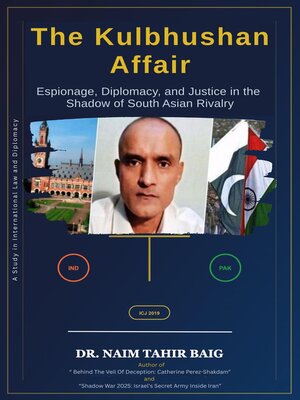The Kulbhushan Affair
ebook ∣ Espionage, Diplomacy, and Justice in the Shadow of South Asian Rivalry
By Dr Naim Tahir Baig

Sign up to save your library
With an OverDrive account, you can save your favorite libraries for at-a-glance information about availability. Find out more about OverDrive accounts.
Find this title in Libby, the library reading app by OverDrive.



Search for a digital library with this title
Title found at these libraries:
| Library Name | Distance |
|---|---|
| Loading... |
Book Description
The Kulbhushan Affair: Espionage, Diplomacy, and Justice in the Shadow of South Asian Rivalry
On March 3, 2016, a former Indian naval officer named Kulbhushan Jadhav was arrested in Pakistan's restive Balochistan province, setting in motion one of the most complex and consequential espionage cases in modern South Asian history. What began as a straightforward arrest quickly escalated into a diplomatic crisis that would ultimately reach the highest court of international law, revealing the intricate web of intelligence operations, geopolitical rivalries, and legal ambiguities that define contemporary India-Pakistan relations.
The Kulbhushan Affair presents the first comprehensive, academically rigorous analysis of this landmark case, tracing its journey from a disputed border arrest to a death sentence by Pakistani military court, and finally to the International Court of Justice in The Hague. Dr. Naim Tahir Baig, drawing upon extensive primary source material including ICJ records, diplomatic correspondence, intelligence assessments, and previously unpublished government documents, offers readers an unprecedented look into the shadowy world where espionage meets diplomacy.
This meticulously researched work goes beyond the headlines to examine the broader implications of the Jadhav case for international law, consular relations, and regional security. The book explores how a single individual became the focal point of competing narratives about terrorism, insurgency, and state sovereignty in Balochistan, while also illuminating the strategic competition between India's Chabahar port project and China's Belt and Road Initiative through Pakistan's Gwadar port. Through careful analysis of the ICJ proceedings, Dr. Baig demonstrates how the case strengthened international consular law while simultaneously exposing the limitations of international legal remedies in politically charged disputes.
What sets this study apart is its commitment to objectivity and balance, presenting both Indian and Pakistani perspectives with equal weight while incorporating insights from neutral third parties. The author examines the human cost of intelligence conflicts, giving voice to the families caught in these geopolitical crossfires, particularly the dignity and suffering of Jadhav's wife and mother during their restricted meetings in Islamabad. The book also places the case within the broader context of South Asian intelligence operations, analyzing patterns of espionage, diplomatic standoffs, and the role of media in shaping public opinion.
As of 2025, with Jadhav's case remaining in legal and diplomatic limbo despite the ICJ's clear judgment, The Kulbhushan Affair serves as both a definitive historical record and a cautionary tale about the limitations of international law in resolving disputes rooted in deep-seated regional rivalries. This work will be essential reading for scholars of international relations, legal professionals specializing in consular law, diplomats engaged in South Asian affairs, and anyone seeking to understand how individual cases can reshape the landscape of international justice and interstate relations.
Dr. Baig's analysis arrives at a crucial moment when India and Pakistan continue to grapple with the implementation of international legal obligations, making this book not just a historical account but a vital contribution to ongoing debates about sovereignty, human rights, and the rule of law in the twenty-first century.







